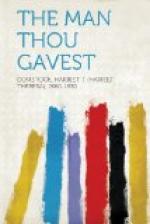“Come on, old fellow,” he said, “better late than never,” and the two descended to the street. They walked sedately for an hour. The dog longed to gambol; he was young enough to associate outdoors with license; but being a friend as well as a dog, he felt that this was rather a time for close comradeship, so he pattered along at his master’s heels and once in a while pushed his cold nose into the limp hand swinging by Truedale’s side. “Thank God!” Conning thought, reaching down to pat the sleek head, “I can keep you without—confession!”
For three days and nights Truedale stayed away from the old home. Business was his excuse—he offered it in the form of a note and a bunch of violets. Lynda telephoned on the second day and asked him if he were quite well. The tone of her voice made him decide to see her at once.
“May I come to dinner to-night, Lyn?” he asked.
“Sorry, Con, but I must dine with some people who have bought a hideous house and want me to get them out of the scrape by remodelling the inside. They’re awfully rich and impossible—it’s a sort of duty to the public, you know.”
“To-morrow then, Lyn?”
“Yes, indeed. Only Brace will be dining with the Morrells; by the way, she’s a dear, Con.”
The next night was terrifically stormy—one of those spring storms that sweep everything before them. The bubbles danced on the pavements, the gutters ran floods, and fragments of umbrellas and garments floated incongruously on the tide.
Battling against the wind, Conning made his way to Lynda’s. As he drew near the house the glow from the windows seemed to meet and touch him with welcome.
“I’ll economize somewhere,” Lynda often said, “but when darkness comes I’m always going to do my best to get the better of it.”
Just for one blank moment Truedale had a sickening thought: “Suppose that welcome was never again for him, after this night?” Then he laughed derisively. Lynda might have her ideals, her eternal reservations, but she also had her superb faithfulness. After she knew all, she would still be his friend.
When he went into the library Lynda sat before the fire knitting a long strip of vivid wools. Conning had never seen her so employed and it had the effect of puzzling him; it was like seeing her—well, smoking, as some of her friends did! Nothing wrong in it—but, inharmonious.
“What are you making, Lyn?” he asked, taking the ottoman and drawing close to her.
“It—it isn’t anything, Con. No one wants trash like this. It fulfils its mission when it is ravelled and knitted, then unravelled. You know what Stevenson says: ’I travel for travel’s sake; the great affair is to move.’ I knit for knitting’s sake; it keeps my hands busy while my—my soul basks.”
She looked up with a smile and Truedale saw that she was ill at ease. It was the one thing that unnerved him. Had she been her old, self-contained self he could have depended upon her to bear her part while he eased his soul by burdening hers; but now he caught in her the appealing tenderness that had always awakened in old William Truedale the effort to save her from herself—from the cares others laid upon her.




